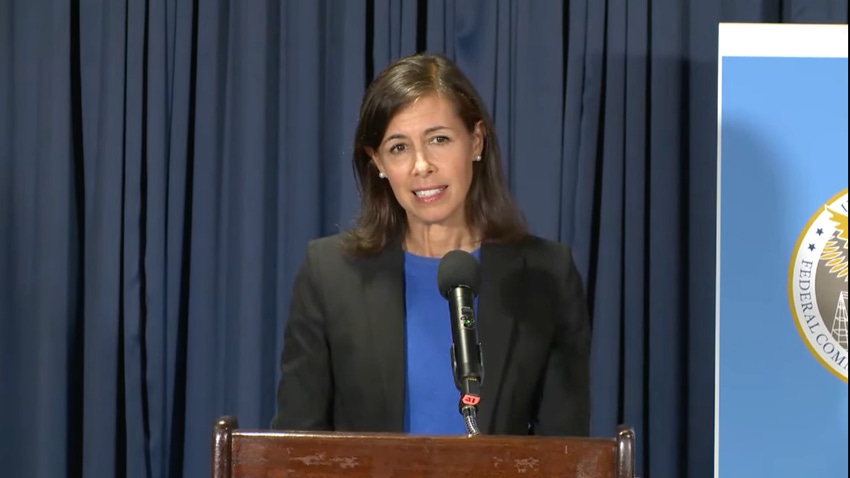FCC Chair starts process to restore Title II authority over ISPs
Net neutrality is rising from the dead again with today's announcement from FCC Chairwoman Jessica Rosenworcel that the agency will vote to largely restore its Obama-era open Internet policies.

FCC Chairwoman Jessica Rosenworcel said the agency will begin a proceeding to restore the FCC's authority under Title II of the Communications Act, reestablishing oversight over broadband companies and enacting nationwide net neutrality rules. In a speech at the National Press Club on Tuesday, Rosenworcel announced her plan to hold a vote on a notice of proposed rulemaking to restore the FCC's open Internet policies during the next open meeting on October 19.
"I believe it is essential that we sustain [the Internet's] foundation of openness. And that's why since I have served at the FCC, I have always supported net neutrality," said Rosenworcel. "Common sense tells us that the nation's leading communications watchdog should have the muscle it needs to protect consumers and make sure their Internet access is fast, open and fair."
The FCC initially voted to enact its Open Internet Order during the Obama administration, under then-FCC Chair Tom Wheeler in 2015. That order, which allowed for FCC regulation of ISPs under Title II of the Communications Act and approved net neutrality rules banning ISPs from blocking or throttling content or enacting paid "fast lanes," was overturned during the Trump administration under FCC Chair Ajit Pai. It was replaced by the Restoring Internet Freedom Order in 2018.
According to senior FCC officials, the Commission is seeking to largely restore the Open Internet Order passed in 2015. However, the agency will propose one change that allows it to block the authorization of broadband companies potentially led by adversarial foreign governments, for national security reasons. In a fact sheet, the FCC added that the proposal "specifically proposes to forbear from 26 provisions of Title II and more than 700 Commission rules that might pose a threat to network investment or are unnecessarily burdensome. Accordingly, policies like rate regulation and network unbundling would be strictly prohibited."
The draft proposal will be circulated amongst the FCC today and published later this week before it is introduced at the Commission's October meeting. If adopted, that will kick off a public comment process on the notice of proposed rulemaking.
Delayed proceeding
Today's move by Chairwoman Rosenworcel has been long awaited, given that support for net neutrality was part of President Joe Biden's 2020 campaign platform. But it was delayed by a long drawn-out process to confirm a fifth Commissioner and third Democrat at the agency.
Indeed, the ultimately successful push against President Biden's first choice for the fifth FCC slot, Gigi Sohn, which further delayed this proceeding for many months, was believed by some to be about the industry's opposition to Title II reclassification.
Now, with Democrat Anna Gomez officially confirmed and sworn in to that final slot, the FCC can move on those rules. Asked at her Senate hearing in June whether she supports Title II reclassification for broadband providers, Gomez said she did.
"I would be supportive of a reclassification to Title II. However ... I don't support rate regulation because I think that competition is the most effective regulator," she said.
At today's press conference, Chairwoman Rosenworcel stressed the importance of classifying broadband as a Title II service.
"Title II is the part of the law that gives the FCC clear authority to serve as a watchdog over the communications marketplace and look out for the public interest," she said. "There are downstream consequences that flow from the agency retreating from Title II, and they need attention."
Rosenworcel pointed to several examples where a lack of Title II authority prevented the FCC from taking action in the public interest, including when firefighters in Santa Clara, California, "discovered that the wireless connectivity on their command vehicle was being throttled" while fighting wildfires. The Title II rollback meant the FCC lacked the authority to intervene, she said.
Cheers, jeers and fears
The news that the FCC will move to reestablish Title II authority and net neutrality rules drew expectedly mixed reactions from those on either side of the issue.
In a statement to the media, Free Press co-CEO Jessica J. González applauded the move by the FCC chair and sought to head off some of the anticipated industry arguments against Title II and net neutrality.
"As this proceeding gets under way, we will hear all manner of lies from the lobbyists and lawyers representing big phone and cable companies. They'll say that Title II's common-carriage standard is a heavy-handed regulation that will undermine investment in new broadband deployment; in reality, capital expenditures by these companies increased under Net Neutrality rules, and declined after the Dec. 2017 Trump FCC repeal. They'll say open-internet protections are a solution in search of a problem; in reality, there's an extensive history of the sorts of industry abuses that Title II oversight would keep in check," said González.
Meanwhile, the analysts at KeyBanc Capital issued an alert saying they expected telecom investors to react negatively to the news even though "the rules are more bark than bite." They added that they view net neutrality rules as "a somewhat outdated view of the Internet" but believe the rules are "a small negative to ISP fundamentals."
One industry group, the Wireless Internet Service Providers Association (WISPA), was swift to declare its opposition to Rosenworcel's announcement: "WISPA has long stood against common carrier regulation of its members' services. Though Title II would allow access to poles, conduits and rights-of-way for broadband providers – something not automatically granted to ISPs today – its cost, and what it augurs for the future of regulation, outweigh that benefit," said WISPA's VP of policy, Louis Peraertz, in a statement.
In another statement to the media, Fiber Broadband Association (FBA) CEO Gary Bolton said the FBA "looks forward to reviewing Chairwoman Rosenworcel's proposal closely and working with all of the Commissioners to ensure the Federal Communications Commission first 'do no harm'."
One of those Commissioners has already made his position known. FCC Commissioner Brendan Carr, one of two Republicans on the Commission, released a statement Tuesday in which he cited a recent legal analysis from former lawyers to President Obama warning that any "attempt by the Commission to impose such broad regulatory requirements under current statutes would be struck down by the Supreme Court," given the current makeup of the court. [Ed. note, updated 9/27: That legal analysis, as per a footnote, was funded by industry trade organizations USTelecom–The Broadband Association and NCTA–The Internet & Television Association.]
"I agree with President Obama's lawyers," said Carr in a statement.
"I would encourage my Commission colleagues to heed the judicious guidance offered by these top lawyers from the Obama Administration and focus the FCC's work on the numerous, important subjects that Congress has authorized the Commission to address—from rural broadband and public safety to spectrum and national security—rather than pursuing the Biden Administration's unnecessary and unlawful plan for exerting government control over the Internet," Carr added.
Anticipating a fierce debate ahead, and hearkening back to the heated protests and threats of violence that emerged during the FCC's prior efforts to impose, and then undo, net neutrality rules, Rosenworcel also used her remarks to appeal for people to "keep speaking up" but "keep it in the lines."
"I have every expectation that this process will get messy at times. I have in fact been to this rodeo before. And I believe peaceful protests are a sign of a healthy democracy. What I worry about is when things get ugly," she said.
About the Author(s)
You May Also Like












